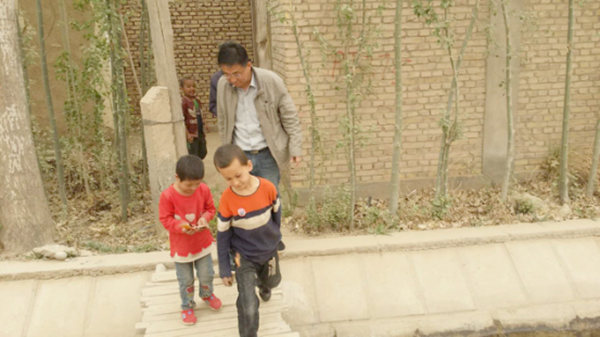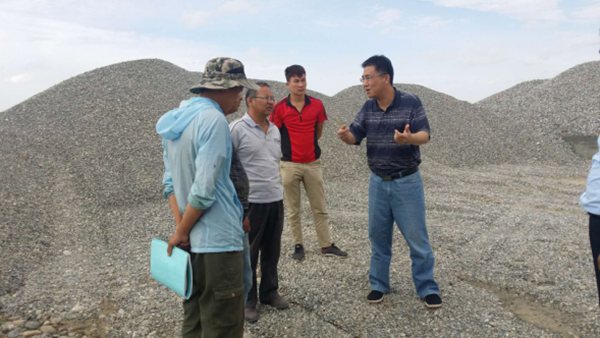Tang Haifeng: Alleviating Poverty from All Aspects
South of the Taklimakan Desert in Northwest China's Xinjiang Uygur autonomous region in the border area lies Pishan, one of China's extremely poverty-stricken towns.
In 2006, China Three Gorges Corporation (CTG) shouldered the mission to help the town overcome poverty.
In July 2017, Tang Haifeng, deputy chief economist of CTG's Shanghai institute, became a member of the ninth team sent to Xinjiang and started his supporting work in Pishan.
In addition to supervising of CTG's poverty alleviation work at the town, Tang was also responsible for water infrastructure construction. He made full use of his professional skills and contributed to education and the hydro industry in the town.

Tang Haifeng visits a poverty-stricken family. [Photo/sasac.gov.cn]
Improving local education
For years, CTG has been putting education at the top of poverty alleviation.
Tang visited local families and communicated with relevant departments in CTG and finally saw the signing of an education supporting protocol between the Pishan town government and CTG.
According to the agreement, the company was to invest 10 million yuan ($1.41 million) annually in the town's education projects between 2018 and 2020.
The funds are used for payment of study, living and traffic expanses of secondary and junior college students from farmers' and herdsmen's families to help them in their secondary and higher education.
More than 4,000 local young people in the town were supported financially and the university-entrance rate in the town has increased thanks to the project.

Tang (R2) measures the time-period of trickle irrigation and inspects the crops. [Photo/sasac.gov.cn]
Promoting local water infrastructure construction
After inspecting local material shortages of the hydro projects, Tang learned the importance of water infrastructure construction to the stable development and reform in Pishan.
In September 2017, he decided to build a 27-kilometer pressure pipeline to supply water for irrigation of 40,000 mu (2,666.67 hectares) of farm land.
The project was to meet emergency needs so it had to be carried out before winter.
Tang and the local water resource bureau negotiated with the Urumqi Railway Bureau on the engineering plans and obtained approval of the railway-related pipeline project within two months.
The project was completed in October 2018, creating a solid foundation for the removal of the 10,000 poverty-stricken families and the irrigation of the vast land.
Tang was also responsible for management of the hydro farming land irrigation. He inspected 274 drought resisting electromechanical wells and urged relevant units to strengthen maintenance.
Within half a month, all the wells went into operation which relieved daily use and irrigation water shortages.
To improve water resource utilization ratios and solve the problem of engineering water shortage, the local government, with the financial aid of the water resource-dedicated and poverty alleviation funds given by the central government, invested more than one billion yuan in more than 70 safe drinking water projects as well as main and branch seepage prevention in the Sangzhu, Pishan River and Duwa River basins as well as the Yapuquan water plant.
Tang with the construction teams examined all the projects and considered all possibilities and risks that might occur during construction in advance to guarantee good progress.
He also protected the quality of each project and construction security during the engineering. Therefore, among water projects within Xinjiang Pishan always had the best quality.
In April 2018, two villages in Pishan got rid of poverty.

Tang inspects construction of a main canal. [Photo/sasac.gov.cn]
Developing local industries
Pishan town has a five-industry development plan. The industries are breeding donkeys, geese, rabbits and sheep, as well as planting agaric.
The sheep industry was initiated by Tang. To better fulfill his duty, Tang learned skills of sheep husbandry and cooperated with professional design institutes and breeding experts on construction details.
Issues related to site selection, slaughter houses design, environmental impact assessment and construction land approval as well as hardware facility construction were also planned in advance.
Alleviating poverty through attracting investment, increasing employment, launching plantation-based desertification activities and developing local tourism were also parts of Tang's work.
This year will be the last year of Tang's poverty alleviation work in Pishan. It is also a year crucial in winning the anti-poverty battle. Tang is still working hard together with local people to help the area escape poverty and become beautiful and vigorous.
(Executive editor: Zhang Tianyuan)



